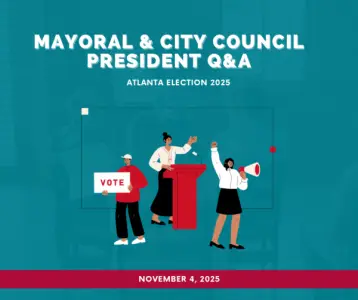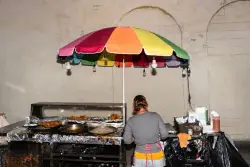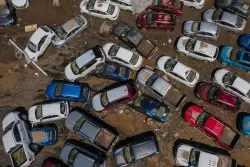Atlanta Election 2025: Q&As with Mayoral and City Council President candidates

Rough Draft sent questionnaires to all the candidates who officially qualified for the City of Atlanta municipal election on Nov. 4. These are the responses we have received so far from the candidates running for Mayor and City Council President. This post will be updated if/when we receive additional responses. Early voting begins Oct. 14 and closes Oct. 31. See a list of early voting locations in both Fulton and DeKalb counties here. To check your voter registration, visit the GA My Voter Page. City Council President Rohit Malhotra rohitforatlanta.com What immediate actions can the City Council take to aid in curbing gun violence in Atlanta? Gun violence in a public health crisis–– and it needs to be treated exactly like that. Immediately, the City Council must: (1) Invest in community-based violence interruption and prevention programs. In Atlanta–– like many other cities–– there are existing organizations on the ground that are trained in violence interruption when there are escalating instances that often result in gun violence. This model, called CBVI (Community-Based Violence Intervention) is used in peer cities that have seen significant reductions in gun violence over the past few years. (2) We need to partner and work directly with Grady Memorial Hospital. Some of the best CBVI work happens through Hospital-Based Violence Intervention (HAVI), where the hospital works with city officials, county officials, service providers, alternative programs, and nonprofits to create an ecosystem approach to solving gun violence and (3) we must create a dedicated funding source to support the underlying propellants and the rippling impacts of gun violence. This means investing in programs that divert young people from harmful, violent activity and provide an alternative pathway to economic and social wellbeing. Additionally, it means making sure families who are impacted by gun violence directly have the financial resources to get support–– from funeral services to therapy to access to legal counsel. All of this can be done immediately and with urgency. This issue is a top priority for me and is an issue I have been focused on addressing for the past 5 years of my career. I led a gun violence reduction program that supported over a dozen community-based organizations, developed a curriculum that has been used nationally, and earned recognition by the Biden Administration and their Office of Ending Gun Violence. I will be a champion on this issue and hope to work with the mayor to prioritize this issue across the city. Transit, especially on the Beltline, remains a top concern for many voters. How can the City Council help to fast-track these projects? We must deliver on transit in this term — even if it’s a modest start. Public trust in the city’s ability to build transit is at an all-time low, and that’s because empty promises have outpaced results. Of the 17 projects voters approved under More MARTA in 2018, only one has meaningfully advanced. (In fact, MARTA has scaled the program back to nine projects by 2028, and only one is slated to be rail.) We can no longer wait on “master plans” or vague dreams. To fast-track transit, council must immediately commit existing funds — including Beltline TAD increments and Moving Atlanta Forward dollars — to specific corridors. In 2023, the Beltline TAD alone collected over $84 million that otherwise would have flowed to schools, counties, and general revenues — a pool we should be mobilizing for transit. We must push one segment (for example the Eastside Trail corridor, which already has 30 percent engineering) toward full design and procurement, then hold city staff accountable to set milestones. To bring the full 22-mile Beltline corridor to 30 percent design would cost about $125 million — so starting with what’s already advanced is smart. We stop treating transit as a debate and start treating it as an execution challenge. Once we build one visible segment, we restore credibility — and unlock momentum for the rest. Gentrification remains an issue for many historic neighborhoods and the longtime homeowners living there. What is your solution to reviving neighborhoods without losing these legacy residents? Atlanta’s neighborhoods are the soul of our city. The definition of gentrification is “the process of making something more refined, polite, or respectable.” Every neighborhood wants and deserves that. But revitalization cannot mean displacement. So I believe we should invest in better infrastructure, sidewalks and greenspaces in historic neighborhoods, but we should also make sure that the people who are already in those neighborhoods today can see themselves in those neighborhoods tomorrow. My solution is to expand tools that help longtime residents stay—like property tax relief for seniors, stronger protections for renters, and investments in affordable housing on publicly owned land. We must also prioritize community land trusts, down-payment assistance for first-time buyers, and home repair programs for legacy residents. Reviving neighborhoods should mean strengthening them, not pushing out the people who built them. Atlanta’s streets continue to be filled with potholes and plates. With more growth and hundreds of thousands of visitors expected for the FIFA World Cup, what is your solution to fixing our streets? The money exists—we just aren’t spending it wisely. Atlanta voters have approved multiple infrastructure bonds and sales tax initiatives, but residents don’t see results quickly enough. My solution is to streamline project delivery, require accountability dashboards so the public can track repairs, and prioritize coordination between utilities and the City so streets aren’t constantly being reopened. We also need to consider working more directly with CIDs (and help establish them where they do not currently exist) to get the work done more efficiently and expeditiously. We need to move from a reactive patchwork approach to a proactive, long-term maintenance plan that ensures our streets are safe for residents. After last year’s catastrophic water main breaks, what can the city council do to make sure the estimated $2 billion in water infrastructure replacements and repairs is expedited as quickly as possible? Last year’s water crisis showed us what happens when we underinvest and delay. City Council must move from reacting to emergencies to executing a clear, transparent plan. First, we need to establish a dedicated project management office to oversee water infrastructure upgrades, with strict timelines and quarterly progress reports to the public. Second, we must align bond dollars and federal infrastructure funds so projects aren’t stalled for lack of coordination. Third, Council must insist on transparency—an online dashboard tracking projects, costs, and deadlines—so residents know where their dollars are going. Expediting $2 billion in repairs is possible, but only if Council prioritizes accountability, cuts red tape, and ensures our city’s basic infrastructure is treated as the public safety issue it is. Mayor Dr. Helmut Lucero-Domagalski Love helmutlovesatlanta.com / @helmutlovesatl What are your plans for addressing the homeless residents of Downtown Atlanta ahead of the 2026 FIFA World Cup? How do you plan to ensure these Atlantans are not displaced or harmed by the increase in tourism to the area? I will have six months to address this issue but my strategy is very much about engaging both traditional and non-traditional mechanisms. Naturally, engaging leading non-profits in the strategy is essential, but I have a sincere desire to see if we can make the investments that accelerate progress forward to more permanent solutions through these actions. This is why I am assigning a One Humanity executive, a single executive over non-profit and education for the city to seek streamlining of services, outcomes and new investments. Depending on their evaluation, I may create a single leader simply for homelessness, and they would lead this effort. Some of my creative concepts include: House of worship partnership – can we work across the broader Atlanta region and expansive Georgia to house some of our homeless for a time – and use this opportunity to better access their needs and connect them with new relationships. The greatest challenge to our homeless besides housing, is their relational poverty. Secondly, I’d like to explore capacity in other cities within Georgia to see what options might be available. I’d also exhaust the possibility of any city or state property availability. It would be a stretch, but I would really love to have recover-live-work contracts developed with the private sector to already start enrolling those homeless that are capable of working into such programs. Programming for the mentally ill or drug addicted homeless will take longer to develop and execute, but these efforts are key to my passion for our homeless and will get a lot of my attention together with the One Humanity non-profit leader I will announce by October 7. Transit, especially on the Beltline, remains a top concern for many voters. What will your transit-related priorities be if elected? First, I want to combat congestion immediately with a RideShare App from the city. I will create a joint venture to innovate an application to ensure that car-pooling efforts are maximized across the region. Secondly, I would keep the commitments our present mayor broke to complete the Beltline rail with the original east-side plan, saving millions. I also believe we need to explore a private/public partnership with Marta – and rebrand it and position it as a broader Atlanta Metro solution. The forthcoming economic crisis and raising prices are demanding a better north-south corridor solution. It is ridiculous that we do not have a world-class, north-south strategy. I am fine with local-station jurisdiction over inbound traffic controls to ensure local preferences for non-local resident traffic and pre-authorization mechanisms be constructed if that is what is required. We can use new transportation to run a “Come to Georgia” corporate attraction strategy, and develop work-live-play centers along new stops to encourage families to thrive and revitalize growth throughout the State. Finally, I want to make the driveability of our local streets a high-visibility priority. I will create opportunities for investors and corporations to sponsor the renaming and revitalization of our streets to address potholes, thereby forever memorializing their names in support of our transition through this period of history. I will also evaluate Atlanta’s infrastructure health comprehensively and leverage new revenues and bond projects for infrastructure. If elected, how will you utilize your office to empower Atlanta’s LGBTQ+ community, specifically moving forward with the LGBTQ+ Community Center? I would empower our community with a different strategy in this season, and table the center for a later time. I have not formed this position lightly, but this comes from the heart of a loving gay father of three daughters who for three years funded The Gayly Dose podcast to elevate our LGBTQ+ community, and saved the lives of several gay men across the south in our work. I’ve also spent countless hours and significant personal dollars to create The Gayly Impact as a non-partisan nonprofit for personal and economic development from gay people, to all people. Firstly, we are stepping into one of the most challenging economic times of our city, and I find it hard pressing to spend money on a building to make a few people in this city’s establishment a lot of profit in building it, instead of investing money directly in our LGBTQ+ citizens. I would expect nothing less of our existing city establishment. Follow the money, and you will find motivation. I would encourage the community to consider the tremendous economic disparity between white gay men and Black and Hispanic trans women. We are building a “house” before the work in the “family” is done. If donors struggle to give to invest in our people, I would encourage you to consider your legacy will be far greater than memorializing your name. We can do that at a later time. As mayor, I will provide the LGBTQ+ community dedicated space to enshrine their history until a better time comes. I will also offer up plenty of city spaces for course work, activity and connection that are safe, perhaps even space at the Atlanta Public Safety Center. I am certain we can also find additional spaces in churches and synagogues throughout the city for the abundance of activities desired. I would instead spend the dollars on three important efforts instead: Education of all on financial literacy, investment in raising up LGBTQ+ entrepreneurs, especially in the lesbian and female trans community, and finally, work to expand in-person personal development opportunities with the existing non-profit and community spaces we have. Our LGBTQ+ dollars are needed for the protection of our people right now- and especially women, lesbian and trans, of all ages, and especially our seniors, who will be most vulnerable in this time. How will you bolster affordable housing in the city while protecting Atlanta’s tree canopy and environmental safety? As further outlined in my six-point plan on my website, we need to fast-track development of publicly owned housing projects that are in process to bring more housing online. An additional tactic I will pursue is incentivizing fractional ownership technology solutions in Atlanta, so more renters can be building equity. I will continue efforts in zoning for mixed-use and multi-family in single-family neighborhoods, with bonuses for build-to-rent housing and building up (which is key to canopy preservation). Finally, I will work with the state to advance movement on rent control, just-cause eviction terms, and increase the enforceability of Section 8 vouchers, which the city alone cannot impact. How will you balance public safety with citizen concerns regarding police accountability? I am a big believer that we need to hire, support and promote a police force that can keep our citizens safe. With economic challenges forthcoming, this will be very important for our city. The Atlanta Public Safety Center is an important area of opportunity to ensure that we develop and utilize the best policies for accountability. I am excited to work with our police chief on this, and also look to create private-public joint ventures to pioneer this field further with experts in the field. The post Atlanta Election 2025: Q&As with Mayoral and City Council President candidates appeared first on Rough Draft Atlanta.


